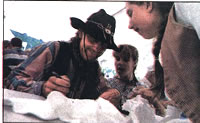By Holly Zachwlah
THE COLUMBUS DISPATCH
NEW CONCORD, Ohio -
Nope. No thanks. No way. Chelsea McPeek.11, would never eat a small, defenseless
critter. Don't put rabbits, squirrels or birds on her dinner plate, thank
you.

So, she says, she would not have enjoyed the journey 200 years
ago of the wagon train that carried about 100 people from Connecticut
and Massachusetts to the unsettled land they had purchased in what would
become central Ohio.
The men and boys on that wagon train would have killed small animals -
quail or squirrels, perhaps - for dinner. That wouldn't have worked for
Chelsea, who lives in Bellevue in northern Ohio.
"I think I would have been miserable," she said. "I would
have starved because there is no way, not in a million years,
I would have eaten a poor, helpless little animal."
Those pioneers, who trekked to an area that would become Worthington,
traveled in September and October 1803.
Last week, Chelsea and her grandmother joined about 140 others in the
Bicentennial Wagon Train that rolled through Muskingum County on its journey
across Ohio in commemoration of the original trek.
The Ohio Bicentennial Commission and the Worthington Bicentennial Committee
are sponsoring the wagon train. A private company- Muleskinner.com was
hired to lead the adventure. In addition, anyone interested in participating
in the event - for a fee - could register and travel along. (Those younger
than 18 were accompanied by an adult.)
The folks who work with the head muleskinner, " Tennessee" John
Stewart,drive the wagons and care for the mules and horses. As often as
possible, they let ,the children take the reins, and, once camp is made
for the night, they offer rides on the horses.
Organizers are making this wagon train as historically accurate as possible,
offering a sense of what life was like for the pioneers but modern riders
don't catch and cook dinner.
The kids onboard (and adults, too) are expected, however, to dress, camp,
work and play as the pioneers did.
A runaway wagon or a frisky mule can provide a sense of danger along the
way. But three cowboys, who come complete with guns (unloaded), knives,
chaps, hats and bandanas, ride along to keep the animals in line and offer
a sense of security if something gets out of hand. They are all career
horsemen who work on ranches when they're not helping Stewart on adventures
such as this.

Still, pioneer life was rough, and a wagon-train ride was especially difficult
and dangerous. For children, however, it was an adventure- seeing new
land, experiencing new things, making new friends.
And that's how the children who rode the wagon train last week described
their journey: sometimes difficult, sometimes scary, mostly fun, but always
an adventure.
Pass the squirrel, please
A few backed beans can go a long way on the trail. In fact, members of
the Kusma family of Ne Wlabany- including Jenni, 14, and Molly, 9,- wouldn't
care if they never saw another dish of beans. They rode last Thursday
and Friday.
Breakfast- usually biscuits and a mixture of potatoes, cheese and sausage
cooked together- is prepared at camp each morning by those who travel
with Steward. Volunteers from the ride often pitch in.
Lunch typically is provided by local volunteers at a stop - usually a
historical site along the way.
Thursday's supper included hamburgers, corn bread and- what
else? - beans. It was about the same Friday.
But to keep eating on the trail, you must clean your plate- literally.
No automatic dishwashers here, just the old-fashioned, two-handed kind.
Everyone riding the wagon train gets a mess kit that includes utensils,
a tin cup and a pie pan that serves as a plate. Water for refilling canteens
is provided, and volunteers at each stop usually offer lemonade or punch.
After Friday's breakfast, the Kusma girls stood in a long line that wrapped
around a steel washtub, where they cleaned their dishes before rinsing
them in hot water and storing them on the wagon.

An snacks? No yogurt or icecream here. Such treates aren't practical without
refrigeration and their's no room in the wagons for coolers. Instead,
it's often granola and bags of potato chips.
On the original wagon train, kids likely would have snacked on jerky (strips
of dried meat) dried apples and peaches and nuts. Mom would hav etaken
along bread she baked at home.
The boys would have hunted for small animals to cook each night, and the
girls would have helped prepare the meals, said Jane Trucksis of the Worthington
Historical Society.
| next page > |